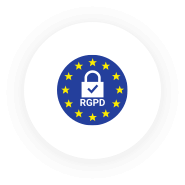What is the RGPD?

The RGPD, or General Data Protection Regulation, is a legal framework set up by the European Parliament to strengthen and unify the protection of personal data within the European Union.
Its aim is to give citizens greater control over their personal data, and to simplify the regulatory framework for international companies. The protection of personal data thus becomes a priority for all companies processing data, whether directly or indirectly.
Phoning and RGPD: the new rules of the game

Companies must comply with several obligations when implementing their telephone prospecting campaigns to comply with the RGPD. Among these obligations are the need to obtain prior and explicit consent from prospective customers, to allow data subjects to exercise their right to be forgotten, and to ensure the security of personal data.
In the event of non-compliance, companies expose themselves to substantial fines and a negative impact on their reputation. Compliance also requires limited training for data protection teams and the integration of simple, free unsubscribe mechanisms, such as blacklist functionality.
Best practices for RGPD-compliant telephone prospecting
Data Collection and Management
To be RGPD-compliant, it’s essential to collect and manage prospects’ personal data securely and transparently. At the time of collection, it is crucial to inform data subjects about the use of their data and to obtain their explicit consent. The database must be protected by robust security systems to prevent any data leakage. Data retention periods must be limited, and data must be deleted or anonymized after this period.
Obtaining consent
Obtaining prior consent is a key step in ensuring RGPD compliance. Consent must be free, specific, informed and unambiguous. Companies must use clear consent forms, including checkboxes for each type of data processing, such as phoning or commercial prospecting by postal mail. The collection of consent must be rigorously documented, so that it can be proven in the event of an inspection by a supervisory authority, such as the Commission Nationale de l’Informatique et des Libertés (CNIL).
Right to be forgotten and unsubscribe
The RGPD grants individuals the right to be forgotten, enabling them to request the deletion of their personal data. To facilitate this process, Kavkom integrates a blacklist functionality. Prospects can unsubscribe easily, for example by pressing a specific key during a call. This unsubscription is then automated by the system, guaranteeing that these contacts will not be solicited again. RGPD compliance is thus ensured, while respecting the preferences of those concerned.
Ensure your RGPD compliance with Kavkom VoIP telephony tools
When it comes to your call campaigns, RGPD compliance is paramount. The Kavkom Automatic Caller offers a secure, compliant solution. You can manually insert the contacts to be blacklisted to automatically exclude them from your campaigns.
What’s more, prospects can unsubscribe by simply pressing the “blacklist” button, automatically excluding them from the system. Make sure you scrupulously comply with the RGPD while optimizing your communication campaign with Kavkom. This feature effectively manages unsubscribe requests and ensures that prospect data is handled securely and in compliance with the legal framework.
RGPD compliance with the Kavkom Automated Calling System
Data security is a top priority in your call campaigns. Thanks to the Kavkom Automatic Caller, you can guarantee scrupulous compliance with RGPD standards. Manually insert the contacts to be blacklisted into the software, and the system will immediately exclude them from your campaigns. An extra measure of protection to ensure compliance with current regulations. This functionality is essential to avoid the risks of non-compliance and the associated fines, while preserving your customers’ trust.
Automated blacklisting for easy unsubscribing
Kavkom’s Call Automator offers advanced blacklist automation. If a prospect no longer wishes to be contacted, he or she can simply press the “black list” button on the predefined menu.
Robot Dialer will automatically exclude this prospect from the system, guaranteeing immediate unsubscription. Efficient unsubscribe management for total respect of your contacts’ preferences. This feature enables quick and efficient implementation of unsubscribe requests, while complying with RGPD requirements.
Security and compliance for worry-free call campaigns
Optimize the security and compliance of your call campaigns with the effective use of the “RGPD blacklist”. With this essential feature of the Kavkom Call Automator, make sure you protect your contacts’ data while scrupulously complying with RGPD standards. Run your campaigns with complete peace of mind, in total security and in full compliance. This approach ensures that all telephone communications are carried out responsibly and legally, which is crucial for maintaining your company’s reputation and avoiding sanctions.
Frequently asked questions
Does the RGPD prohibit telephone canvassing?
No, the RGPD does not ban telephone prospecting, but it does impose strict rules on prior consent and personal data protection. Companies must obtain explicit consent and inform prospects about how their data will be used.
How can I obtain prospect consent?
Consent can be obtained by clear and transparent means, such as online consent forms or checkboxes when registering for services. Documenting consent is essential to prove compliance in the event of an audit.
What happens if a prospect wishes to unsubscribe?
If a prospect wishes to unsubscribe, they can do so easily via Kavkom’s “black list” functionality. By pressing a specific button, they are automatically excluded from future call campaigns.
What are the consequences of not complying with the RGPD?
Companies that fail to comply with the RGPD may be subject to various sanctions handed down by the CNIL’s restricted panel after an adversarial procedure. Possible sanctions include:
- Call to order: A simple warning to remind you of your legal obligations.
- Compliance order: A request for compliance, with a possible penalty of up to 100,000 euros per day of delay.
- Limitation or prohibition of processing: Temporary or definitive limitation or total prohibition of data processing.
- Withdrawal of certification: The withdrawal of any certification obtained.
- Suspension of data flows: Suspension of data flows to a third country or international organization.
- Suspension of binding corporate rules: Partial or total suspension of the decision to approve Binding Corporate Rules (BCR).
- Administrative fine: A fine of up to 10 million euros or 2% of worldwide annual sales for serious breaches. For the most serious breaches, this amount can rise to 20 million euros or 4% of worldwide annual sales.
- Publicity of decisions: The decision may be made public and inserted in publications, newspapers and other media at the expense of the sanctioned company.
There is also a simplified sanction procedure for minor or less complex offences. Sanctions under this procedure include a call to order, a fine of up to 20,000 euros, or an injunction with a penalty payment capped at 100 euros per day of delay. These sanctions cannot be made public.
In short, non-compliance with the RGPD can result in severe financial penalties, operational restrictions and negative reputational impacts. It is therefore crucial to comply with RGPD requirements to avoid these consequences.
Source : CNIL
How does Kavkom help comply with the RGPD?
Kavkom offers tools such as call automation with blacklisting, secure call recording and advanced data management to ensure RGPD compliance and protect prospects’ personal data.
What types of personal data are affected by the RGPD?
The RGPD concerns all personal data that can directly or indirectly identify a natural person, such as name, address, telephone number and contact information.










